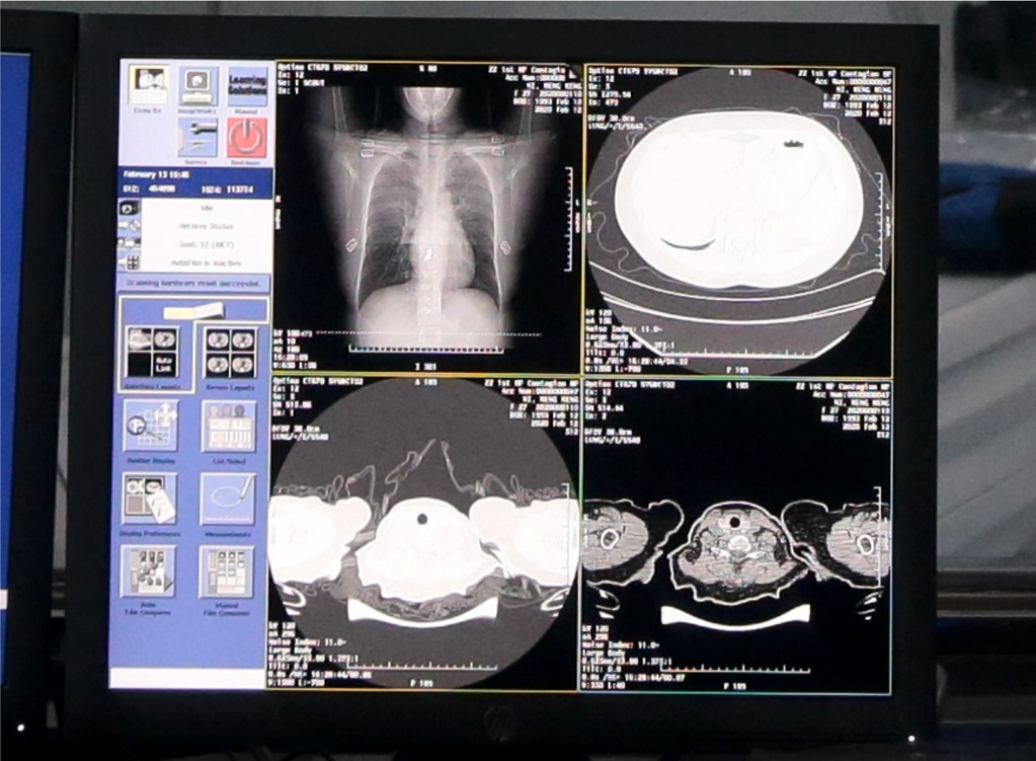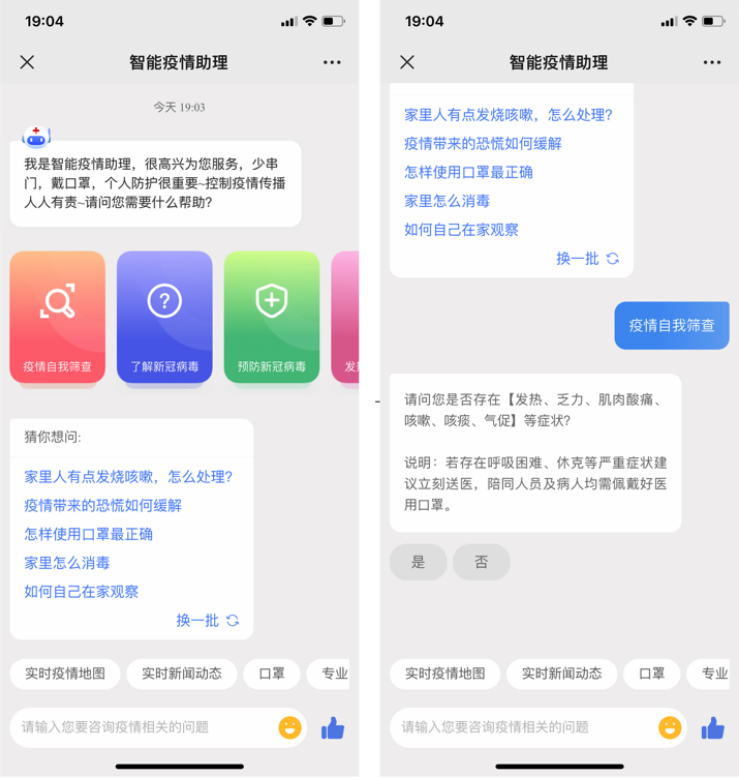
Nitheesh NH
In our Coronavirus Briefing series, we outline the possible impact of the coronavirus (now officially named COVID-19) outbreak on economies, sectors and businesses. In this report, we look at how tech companies in China are leveraging AI, cloud computing and automated messaging services to battle the outbreak.
AI for Screening CT Images
Doctors spend five to 15 minutes to analyze over 300 CT images just to make a single coronavirus diagnosis in a suspected patient. To speed the process, the Damo Academy, Alibaba’s research institute, developed an AI algorithm that can complete the same analysis in 20 seconds.
According to Alibaba, the system studied over 5,000 CT images and data from confirmed coronavirus cases to “learn” how to distinguish a CT scan from patients infected with coronavirus from those with other infections such as viral pneumonia. The company says it has an accuracy rate up to 96%. The system has already been deployed in over 16 provinces and municipalities in China, including Hubei and Guangdong provinces, the hardest hit parts of the country.
[caption id="attachment_105032" align="aligncenter" width="700"] Alibaba’s Damo Academy uses AI to diagnose coronavirus infection
Alibaba’s Damo Academy uses AI to diagnose coronavirus infection
Source: Alibaba[/caption] Ping An Smart Healthcare, owned by Ping An Insurance, debuted its own coronavirus AI algorithm on February 28. Similar to Alibaba’s technology, Ping A’s AI algorithm can analyze a suspected patient’s CT images and make a single diagnosis in 15 seconds. According to Ping An Insurance, the accuracy rate of the AI algorithm is around 90%. As of March 3, the system had been used on over 2,000 patients. AI to Detect Fever in Crowds Shenzhen-based Kuang-Chi Technology used AI technology to create smart helmets equipped with infrared cameras that can detect a person with a fever up to 15 feet away—even in a crowd. JD.com launched a smart body-temperature screening system to scan people in public places. AI for Online Medical Consultations With more people going online for medical services, JD.com launched a chatbot app that answers enquiries such as what to do when a family member has a fever, how to wear a surgical mask, how to disinfect the household and general self-screening information. For complicated enquiries, the app transfers to customer service personnel. Tencent also launched free online medical consultations: People can ask questions and get a basic diagnosis via Tencent’s chatbot. [caption id="attachment_105033" align="aligncenter" width="520"] JD.com uses ChatBot to help with basic diagnosis
JD.com uses ChatBot to help with basic diagnosis
Source: JD.com[/caption] Cloud Computing To Support Research Researchers around the world are racing to find a vaccine for coronavirus. Alibaba’s cloud computing division, Alibaba Cloud, teamed up with the Global Health Drug Discovery Institute to develop AI-based research and a big data platform. The platform analyses and integrates historical medical data from SARS, MERS and other coronaviruses, then makes the data available to researchers around the world. Alibaba Cloud is also offering free access to technology that can be used in viral gene sequencing, protein screening and other research efforts. Tencent Cloud is also offering free cloud-based computing solutions for research on vaccines and new drug testing. Technology company Baidu teamed up with Linking Med, a Beijing-based radiotherapy-focused medical cloud provider to develop an algorithm system called LinerFold and is making it available to scientists around the world, especially gene testing centers, epidemic control institutions and research institutions. Baidu says LinerFold can increase the speed of research into the coronavirus. Telecommunication giant Huawei’s cloud unit joined forces with biotechnology company GrandOmics Biosciences to develop a technology to analysis the genetic makeup of the COVID-19 coronavirus and made the technology available to research institutions. Appendix: Selected Conference and Tradeshow Announcements and Cancellations
 Alibaba’s Damo Academy uses AI to diagnose coronavirus infection
Alibaba’s Damo Academy uses AI to diagnose coronavirus infectionSource: Alibaba[/caption] Ping An Smart Healthcare, owned by Ping An Insurance, debuted its own coronavirus AI algorithm on February 28. Similar to Alibaba’s technology, Ping A’s AI algorithm can analyze a suspected patient’s CT images and make a single diagnosis in 15 seconds. According to Ping An Insurance, the accuracy rate of the AI algorithm is around 90%. As of March 3, the system had been used on over 2,000 patients. AI to Detect Fever in Crowds Shenzhen-based Kuang-Chi Technology used AI technology to create smart helmets equipped with infrared cameras that can detect a person with a fever up to 15 feet away—even in a crowd. JD.com launched a smart body-temperature screening system to scan people in public places. AI for Online Medical Consultations With more people going online for medical services, JD.com launched a chatbot app that answers enquiries such as what to do when a family member has a fever, how to wear a surgical mask, how to disinfect the household and general self-screening information. For complicated enquiries, the app transfers to customer service personnel. Tencent also launched free online medical consultations: People can ask questions and get a basic diagnosis via Tencent’s chatbot. [caption id="attachment_105033" align="aligncenter" width="520"]
 JD.com uses ChatBot to help with basic diagnosis
JD.com uses ChatBot to help with basic diagnosisSource: JD.com[/caption] Cloud Computing To Support Research Researchers around the world are racing to find a vaccine for coronavirus. Alibaba’s cloud computing division, Alibaba Cloud, teamed up with the Global Health Drug Discovery Institute to develop AI-based research and a big data platform. The platform analyses and integrates historical medical data from SARS, MERS and other coronaviruses, then makes the data available to researchers around the world. Alibaba Cloud is also offering free access to technology that can be used in viral gene sequencing, protein screening and other research efforts. Tencent Cloud is also offering free cloud-based computing solutions for research on vaccines and new drug testing. Technology company Baidu teamed up with Linking Med, a Beijing-based radiotherapy-focused medical cloud provider to develop an algorithm system called LinerFold and is making it available to scientists around the world, especially gene testing centers, epidemic control institutions and research institutions. Baidu says LinerFold can increase the speed of research into the coronavirus. Telecommunication giant Huawei’s cloud unit joined forces with biotechnology company GrandOmics Biosciences to develop a technology to analysis the genetic makeup of the COVID-19 coronavirus and made the technology available to research institutions. Appendix: Selected Conference and Tradeshow Announcements and Cancellations
- Mobile World Congress (February 24–27; Barcelona, Spain) is officially canceled for 2020.
- Facebook Global Marketing Summit (March 9–12; San Francisco, US) is canceled.
- Facebook F8 developer conference (May 5–6; San Jose, US) is canceled.
- Geneva International Motor Show (March 5–15; Geneva, Switzerland) is canceled.
- Game Developers Conference (March 16–20; San Francisco, US) is postponed until the summer.
- Google I/O (May 12–14; Mount View, US) is canceled. The event will be held digitally.
- Shoptalk (March 22–25; Las Vegas, US) rescheduled to September 14–17, 2020.
- The Inspired Home Show (March 14–17; Chicago, US) is canceled.